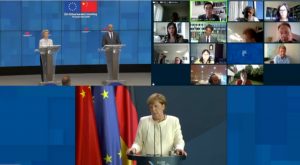On Monday, Chinese President Xi Jinping held a virtual meeting with European Council President Charles Michel, European Commission President Ursula von der Leyen, and German Chancellor Angela Merkel.
Von der Leyen described the talks as “frank and open… constructive and intense” in a nod to growing points of friction between the two sides.
“Europe needs to be a player, not a playing field,” Michel declared in the post-meeting press conference. “Today’s meeting represents another step forward in forging a more balanced relationship with China.”
According to Michel, the meeting addressed “four key topics”: climate change, economic and trade issues, “international affairs and human rights,” and “COVID-19 and economic recovery.”
The video call was a sharply downgraded version of what was once planned as a massive in-person summit to be held in Leipzig, Germany this September, bringing together Xi and the heads of state of all 27 EU member countries. The summit – and a long-dreamed-of bilateral investment treaty between China and the EU, known as the Comprehensive Agreement on Investment (CAI) — was to be the crowning achievement of Germany’s rotating presidency of the Council of the EU. But the in-person summit was cancelled months ago, officially due to the coronavirus pandemic. However, as Theresa Fallon outlined in the cover story for the latest issue of The Diplomat Magazine, there were deeper issues involved.
The first nine months of 2020 have seen a significant hardening of European positions on China, both from the EU as a whole and from individual member states. China’s “mask diplomacy” and disinformation attempts amid the pandemic alienated Europeans governments and the public alike. Meanwhile, longstanding human rights concerns can no longer be ignored, as every week seemingly brings new evidence of atrocities against ethnic minorities in China and repression in Hong Kong. Meanwhile, China has shown little evidence of budging on the market access European politicians have been demanding, with increasing volume, for years.
Amid these tensions, Foreign Minister Wang Yi’s visit to Europe in late August caused more controversy than it soothed.
Xi had a similar mission set as Wang: Bolster China’s ties with Europe to avoid seeing the EU side with the United States in an emerging great power contest. In the virtual meeting, Xi proposed four new principles to guide China-Europe relations: “peaceful coexistence, openness and cooperation, multilateralism, as well as dialogue and consultation.” In Chinese, these were labeled as the “four persists,” more directly making the point that these principles are in need of defending – implicitly, from the United States. (Wang made this connection more directly from Moscow last week, where he accused the U.S. of being the “biggest destroyer” of the international order.)
But China’s discussion of solidarity in the name of multilateralism rings hollow in Europe without concrete action to demonstrate a willingness to uphold the actual values the current international order is built on: open markets, respect for international law, and human rights. And on those fronts, the two sides seem as far apart as ever.
As predicted, there were no major breakthroughs on the CAI during the virtual meeting. Xi, Merkel, Michel, and von der Leyen did agree to “speed up” negotiations, according to Xinhua, with the goal of completing talks by the end of the year.
At the post-meeting press conference held by the European side, von der Leyen was less sanguine about the future of the CAI. She noted important progress has been made, but added, “I want to caution that a lot – a lot – still remains to be done,” especially on market access issues. The EU would not be willing to meet halfway on market access, she indicated. Instead, “China has to convince us that it’s worth having an investment agreement.”
The two sides also agreed to set up “high level dialogues” on the environment and climate as well as digital issues. The environment is an issue of much friction between Europe and the United States, as the Trump administration has withdrawn the country from the Paris climate agreement and consistently downplays the threat of climate change. Thus seeking cooperation on climate action is one of Germany’s key priorities for relations with China, according to a top German diplomat for the Asia-Pacific. On digital issues, China may be seeking European buy-in for its recently unveiled “Global Initiative on Data Security,” Beijing’s efforts to help shape international rules on data and other digital issues.
Before the meeting, in an open letter addressed to Michel, von der Leyen, and Merkel, 63 members of the European Parliament had asked the European leaders to also “substantially” address “widespread serious and ongoing human rights violations occurring in the People’s Republic of China,” including Xinjiang and Hong Kong. The EU press conference made clear that human rights had in fact been on the agenda, although there was little mention of that in Xinhua’s initial coverage.
Michel raised EU concerns with the Hong Kong national security law and the treatment of minorities in Xinjiang and Tibet. According to Merkel, there was even a hint of progress, as Xi “did make an offer” to allow visits to Xinjiang by foreign ambassadors to order to advance human rights dialogue.
In another topic Beijing would be keen to downplay, Michel and von der Leyen also stressed the need for China to provide full cooperation for an international investigation of the origins of the COVID-19 pandemic – a sensitive topic for China, given the virus’ initial emergence in Wuhan.
Michel also said the European leaders had called on China to “refrain from unilateral actions in the South China Sea.”
Merkel concluded her remarks by noting the leaders had discussed holding a full, in-person China-EU summit – like the one originally planned for Leipzig — once the pandemic allows it – perhaps in Brussels.

































